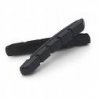Hi Mussels,
Disc brakes are more popular for mountain bikes, and v-brakes for most others. Just to confuse matters bmx use U-brakes, road bikes (the lycra gang as they are affectionately referred to on this forum) use caliper brakes and cyclo cross use cantilevers. V brakes are a type of cantilever. Now for anyone who is still awake I will explain why....
Each brake offers a certain advantage to certain styles of cycling. Disc brakes(hydraulic) are super powerful, but offer an advantage to mountain bikes mainly as they don't clog in the mud and work in all weather conditions. Now the disadvantages are the extra weight(though there are super light carbon versions available), and maintainence. Neither of which the mountain bikers are usually all to bothered about.
Road bikes use calipers for weight alone, they are the lightest brakes available,and lets face it proper roadies(lycras) don't actually brake.Ever.So the poor performance doesn't matter as much as weight. Plus they never get muddy.
Cyclo cross bikes use cantilevers as thats in the rules of the sport. That is the main reason to be honest.
BMX bikes use U brakes as they allow reasonable braking performance, but the main point is they allow the handlebars to be rotated 360 degrees for tricks. Again no mud in BMX, weight isnt a problem so thiese are the ideal brakes.
Now V brakes are for everything else. This is because they work very well, are easy to maintain, very simple and light. To be honest they are perfect for most E bikes used for general use and commuting.
In my opinion hydraulic disc brakes are better in performance, but V brakes perform well enough for most E-bikers and are light and easy to maintain. This is why they are very popular. Hydraulic discs are a bit overkill to be honest, if you are hurtling down the Alpes off road through the mud on your E-bike you should probably look at a new bike.
There are a couple of other things to consider. There are disc brakes that aren't hydraulic. These are a waste of space, as they are really for looks only. They offer no extra power. In fact a well set-up set of V brakes will out perform a cable operated disc!

Also hydraulic discs can become contaminated easily, so extra care must be taken when cleaning and lubricating etc.










